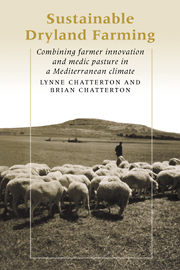 Sustainable Dryland Farming
Sustainable Dryland Farming Book contents
- Frontmatter
- Contents
- Preface
- Part one Medic and other systems
- Part two The Projects
- 4 A demonstration medic farm in Libya
- 5 The grazing phase and farmer training
- 6 A medic project in Algeria
- 7 A medic project in Jordan
- 8 Two medic projects in Iraq
- Part three Institutions, agencies, local farmers and technicians
- References
- Index
5 - The grazing phase and farmer training
Published online by Cambridge University Press: 22 September 2009
- Frontmatter
- Contents
- Preface
- Part one Medic and other systems
- Part two The Projects
- 4 A demonstration medic farm in Libya
- 5 The grazing phase and farmer training
- 6 A medic project in Algeria
- 7 A medic project in Jordan
- 8 Two medic projects in Iraq
- Part three Institutions, agencies, local farmers and technicians
- References
- Index
Summary
Introduction
The grazing phase that eluded the demonstration farm staff in El Marj was demonstrated well, however, on the Western Australian project run by the Gefara Plains Authority. This Authority purchased the equipment and machinery needed to provide the infrastructure for the development sites and the individual farms which were eventually to be allocated to farmers from Western Australia and they also employed Western Australians to establish medic/cereal rotations on the project sites. Some of the Libyans selected as prospective farmers were expected to work with the expert Australian farmers during the development phase so that they could learn tillage and other skills and acquire management experience of a medic/cereal rotation before they took up their own farms.
The Gefara Plains cereal project
Background
The project contracted to the Western Australian Overseas Project Authority (WAOPA) by the Gefara Plains Authority covered a drier zone than that of Jabel el Akhdar project. The Gefara Plain, which runs east, south and west of Tripoli, is bounded to the south and east by a major escarpment leading to a high plateau. The cereal project consisted of 50 000 ha divided into seven sites, five of which were on the plain and two on the plateau. A central workshop and administrative centre was set up at Al Aziziah, south of Tripoli. The soils are mainly yellow or red brown calcareous sands, and the winter rainfall and hot dry summers are typical of those to which the team were accustomed in Western Australia.
- Type
- Chapter
- Information
- Sustainable Dryland FarmingCombining Farmer Innovation and Medic Pasture in a Mediterranean Climate, pp. 122 - 142Publisher: Cambridge University PressPrint publication year: 1996


